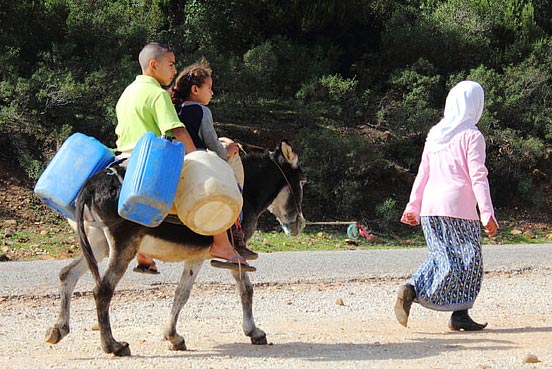Donkeys are historically known to help carry loads over long distances, specifically in hilly areas. They have been used for the same since 2700 BC, and they were used due to the donkey’s agreeable temperament and endurance to variable agro-climatic conditions; But how far can a donkey travel in a day? On average, domesticated donkeys can travel about 25 miles a day, and wild donkeys can travel about 15 miles a day.
Generally, donkeys can travel from 4 to 31 miles a day (across ages, weights carried by them, and various types of donkeys), but the average is accounted as 15 miles as a general rule. Donkeys, on average, travel at the speed of 3.5 miles per hour, which is the same as humans. This makes them the perfect companions to walk with.
How often does a donkey need rest while walking long distances?
Though donkeys prefer warm climates to cold climates, they tire easily if it’s too hot. In warm and comfortable temperatures, resting your donkey every 4-5 hours is preferable. Though these are researched numbers, it’s always best to look for signs from your donkeys as to how comfortable your donkeys are during the walk.
If your donkey starts to flag or droop their heads, slow down the walking pace, and if they begin to not respond to your cues, they are tired and would like to rest. You can then feed them food and water to regain their energy, stop for a little while and start again.
Donkeys generally do not enjoy the cold and often look for warmth, like retreating to their shelters. Therefore, taking your donkey walking in such climates is not advisable. In general consensus, a donkey considers anything below 57.2°F (14℃) to be cold, but their resistance to cold differs in many regions; Therefore, observing your donkeys and their response to the cold is the best way to figure out how cold they are. A tell-tale sign of them being cold is when they shiver, seek shelter, or bray at night.
How much weight can a donkey carry on a walk?
The weight a donkey can carry depends on the donkey’s age and health. ‘In Zimbabwe, it has been recommended that in their initial years, donkeys can carry about one kg for every month of their age. Thus, a three-year old could carry 36 kg. Depending on the local conditions, adult animals should be able to carry 40 – 80 kg.
In the UK, it is recommended that donkeys don’t carry any weight until 5 years of age to decrease the risk of osteoarthritic changes in their bodies due to overworking an underdeveloped body. Generally, the weight a healthy adult donkey can carry is measured in relation to their body weight and is capped at 20% of their body weight.

It’s important not to cross this threshold at any point, as carrying heavy weights over long periods can cause unfavorable health concerns for your donkey and adversely affect them. Interestingly donkeys can also pull more weight than they can carry. This ranges to about twice their body weight. Therefore, if you’re looking to transport hefty loads using donkeys, having a cart that donkeys can pull might be a more effective method of moving things across.
Things to remember before taking your donkey on a walk.
- Since donkeys are majorly used for transportation and walk a lot for it, taking good care of their hooves is essential. Regular trimming is required, and managing the load applied on the donkey is important to avoid injuries.
- A healthy and physically fit donkey can carry more weight and walk longer than an unhealthy and sedentary donkey. Therefore, though the percentage of weight a donkey can carry is 20% of their body weight, it can differ based on the health and activity of the donkey.
- While applying weight on a donkey, make sure to have a pack saddle to help load the weight and prevent any injuries to the donkey’s back. It’s also important to maintain the balance of the weight you apply on your donkey, as donkeys can carry more weight balanced than unbalanced. Having unbalanced weights weighed on your donkey also adversely affects their balance and health.
Conclusion
On average, a healthy and physically fit donkey can travel 15 miles a day. While we take our donkeys for a walk and for travel, it’s important to understand their needs, such as how much weight they can carry, the weather, and schedule their water breaks and rest breaks along the way.
Since we use donkeys to travel carrying weights, giving attention to their hooves and trimming them regularly is a great way to keep your donkey healthy and prevent foot-related issues that may arise. Donkeys are no doubt strong animals that can carry more weight compared to other domestic animals, but it is important not to overwork them and take care of them.
References:
https://www.biorxiv.org/content/10.1101/2022.03.07.483371v1.full

![How Far Can a Donkey Travel in a Day? [Plus Tips to Take Them on a Walk] How far can a donkey travel in a day](https://donkeyonfarm.com/wp-content/uploads/2022/11/How-far-can-a-donkey-travel-in-a-day.jpg)

![How Cold is Too Cold for a Donkey? [Plus Tips to Keep Them Warm] How-Cold-is-Too-Cold-for-a-Donkey](https://donkeyonfarm.com/wp-content/uploads/2022/09/How-Cold-is-Too-Cold-for-a-Donkey-270x180.jpg)
![How to Get Rid of Flies on Your Donkey? [Plus Prevention Methods] How to Get Rid of Flies on your Donkey](https://donkeyonfarm.com/wp-content/uploads/2022/05/How-to-Get-Rid-of-Flies-on-your-Donkey-270x180.jpg)

![Should Donkeys Be Stabled at Night? [With Alternatives to a Stable] Should-donkeys-be-stabled-at-night](https://donkeyonfarm.com/wp-content/uploads/2023/04/Should-donkeys-be-stabled-at-night-270x180.jpg)